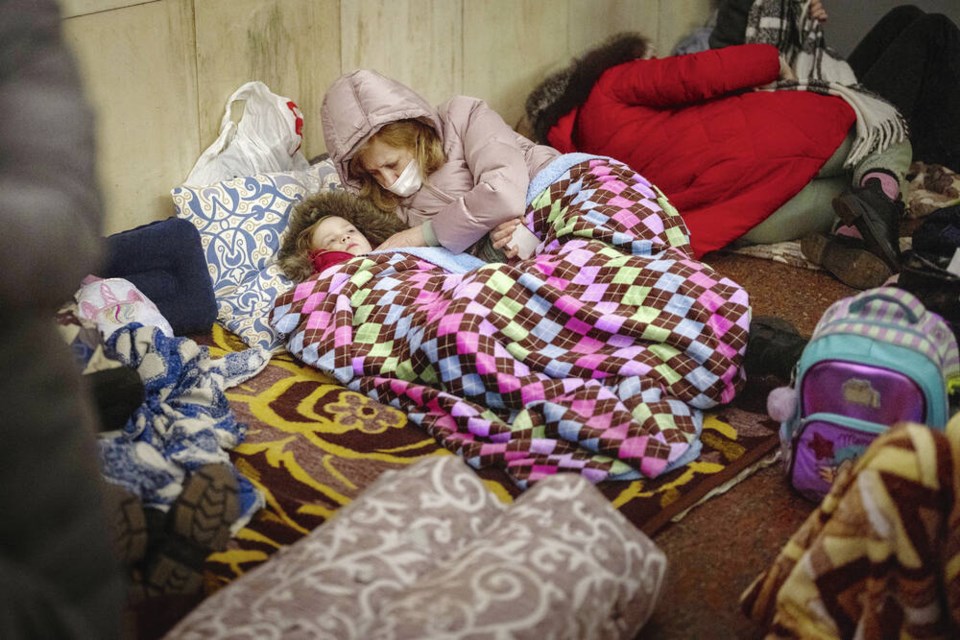Father Yuriy Vyshnevskyy is shovelling snow from his stairs before Thursday morning’s service.
What, he is asked, does a priest tell parishioners to do on a day like this?
He pauses. “Here? Pray.”
Maybe if he was back in Ukraine, in one of the cities getting pounded by the Russians, the talk would be about fighting the invaders. In Victoria, though, 8,740 kilometres from Kyiv, resistance is more likely to involve working a keyboard, rallying other Canadians, urging the democratic world to put a serious economic squeeze on Vladimir Putin.
A half dozen mostly grey-haired, anxious souls showed up at Caledonia Street’s Ukrainian Catholic Church of St. Nicholas the Wonderworker on Thursday, seeking solace in a mad world that had become madder overnight. Led by Vyshnevskyy, who by then had traded his toque and shovel for gold-threaded vestments, they looked for strength in the Divine Liturgy (that’s what Eastern churches call Mass). Much of the liturgy was sung, half in English, half in Ukrainian, in a call and response between priest and parishioners, the rites rooted in soil far, far away.
Church members were feeling the distance as the invasion unfolded. Vyshnevskyy, who came to Canada from Ukraine 14 years ago, conducted the morning service after spending the wee hours scrolling through Ukrainian websites. He had tried going to bed and turning out the lights, but ended up being awake all night. “I couldn’t sleep.”
Likewise, parishioner Motria Koropecky, a Victoria woman who was born in Ukraine but came to Toronto as a little girl, was glued to her feed. The airport close to where her mother’s family is from was attacked. Koropecky’s daughter was in tears after cousins in Ukraine sent her images of an explosion. “I feel sick to my stomach,” Koropecky said. “It’s upsetting.”
But what to do? Back in Toronto, she was part of a Ukrainian community so large that her mother never did have to learn English. Victoria’s not like that. “We’re small.”
Small, but with tight connections to the old country. People who immigrated in the past 20 years make up a good proportion of the congregation. “Many, many have family back in Ukraine,” said Robert Herchak, the acting president of the Victoria chapter of the Ukrainian Canadian Congress.
Herchak is a regular at St. Nicholas — “I try to come every day, if I can” — but said it felt particularly important to show up after the invasion. Lately he has kept a print-out of the church’s Prayer for the Afflicted People of Ukraine in Time of War that he has kept at his bedside. “Deliver Your vulnerable people from unjust aggressors, foreign invasion and the terror of war,” it reads, in part.
The fact that the church printed the prayer in advance shows that the invasion was not all that unexpected, at least by those who were paying attention, including many of the 1.3 million Canadians who claim at least some Ukrainian heritage. The warning signs have been building. Victoria’s Ukrainian-Canadians rallied in front of the legislature in January and again in Centennial Square on Feb. 6.
It’s not like Moscow has been shy to muscle Ukraine in the past, annexing Crimea in 2014. Longtime St. Nicholas parishioners will remember the 1968 visit of church leader Joseph Cardinal Slipyj, who had recently been freed after 18 years in Soviet labour camps.
Still, the invasion strayed so far from modern norms that it came as a shock. In 1996, economist Thomas Friedman came up with the Golden Arches Theory, which posits that no two countries that both have McDonald’s are likely to wage war against one another. The idea is that developed countries, ones that are prosperous enough to sustain Mickey D’s, don’t behave with such naked aggression. Vladimir Putin just blew apart that theory with his missiles.
But what to do? At St. Nicholas, they argued the democratic world should push back with serious sanctions. “Make it really costly for Putin and his inner circle, those wealthy, wealthy oligarchs,” Vyshnevskyy said. Herchak invited Victorians to attend a Stand With Ukraine rally in front of the legislature at 12:30 p.m. Sunday.
It still feels so far away, though. Vyshnevskyy ended Thursday’s service by praising the Ukrainian troops defending their country. The “new martyrs,” he called them. Here? Pray for peace, he said, even if doing so feels insignificant.

